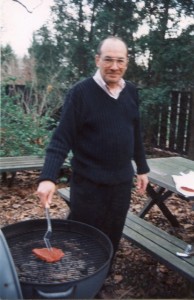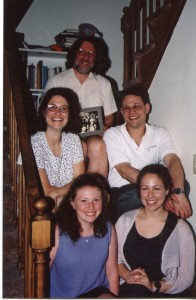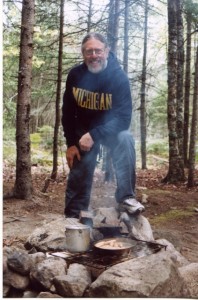For seven weeks I have been studying Ruth. Slowly over time. Savoring every word. It is a short book. Only four chapters. But there is so much in it. I knew that Ruth would be the subject of our Tikkun L’eil Shavuot.
I was hoping to find something in looking closely at Ruth, like we looked closely at Zipporah. And after this in depth analysis I am not sure it is there. This careful reading reminds me of the dangers of prooftexting. Of the need to be faithful to the text and not read into it what isn’t necessarily there. Yet, I was hoping to find the key to the puzzle of who is a Jew.
You see, Ruth is a Moabite woman, a widow, who decides, against her mother-in-law’s advice, that she will cling to Naomi. “Entreat me, urge me not to leave you and from following after you. For wherever you go, I will go, where you lodge I will lodge, your people shall be my people and your G-d, my G-d.”
Can she even convert? Traditional sources would say no precisely because she is a Moabite, forbidden from becoming one of us because they did not give us food and drink when we were wandering in the desert. However, the traditional commentaries get around this by saying it is OK because she is a Moabitess, a woman, and our argument was not with the women. It was the men who refused to welcome us in the desert. Frankly that doesn’t help me.
Did she convert? What is missing here in the actual text is our traditional recipe for conversion. No year long study with the rabbi. No beit din. No immersion in a ritual bath. No mikveh even in the commentary. I really wanted that to show up. So did she convert?
The rabbis say yes. Like traditional converts, three times Naomi pushes her away and tells her to return to her people.
“Rabbi Samul ben Nachmani said in the name of Rabbi Yudan bar Chaninah: Three times it is written “return . . . return . . . return,” parallel to the three times that we push away a convert. And if they trouble themselves furhter (to convert), then we receive them. Said Rabbi Yitzcahk: “No stranger slept outside” (Job 31:32) – one should always push away with the left, and bring closer with the right.” Ruth Rabbah 2:16
In fact, Ruth is compared to Abraham. Like Abraham who followed G-d to a land that would be shown to him, Ruth is willing to follow Naomi. Like the midrash that invents a dialogue between G-d and Abraham, the midrash invents a dialogue between Naomi and Ruth. Naomi instructs Ruth between each statement as to what it means to be a Jew:
“(Regarding one who wishes to convert) “We don’t go into great detail for him, and we don’t investigate him.” Rabbi Elazar asked: “What is the source for this.” It is written: “And she (Naomi) saw that her (Ruth’s) resolve was strengthened to go with her, and she stopped speaking to her.” (Ruth 1:18).
– She (Naomi) said to her (Ruth) “We have a prohibition of Sabbath Borders” (Ruth replied) “Wherever you go I will go.”
– (Naomi said to Ruth) “Yichud (privacy between an man and a woman outside of matrimony) is forbidden to us.” (Ruth Replied) “Wherever you lie, I will lie.” (Ruth 1:16)
-(Naomi said to Ruth) “We concern ourselves with 613 commandments.” (Ruth Replied) “Your nation is my nation.”
– (Naomi said to Ruth) “Idol worship is forbidden to us.” (Ruth Replied) “Your G-d is my G-d.” (Ruth 1:16)
– (Naomi said to Ruth) “four forms of the death penalty were given to our courts.” (Ruth Replied) “As you die, so shall I die.”
– (Naomi said to Ruth) “Two graves were given to the court.” (Ruth Replied) “And there I shall be buried.” Immediately (after this conversation) “And Naomi saw that Ruth’s resolve was strong.”
Ruth is persistent and eventually Naomi is left silent. “And when she saw that she was steadfastly minded to go with her, she left off speaking to her.”
There are variants amongst the various midrashim. I am not sure that this is the dialogue that I would have invented. Mine might have been more like this:
Ruth: Wherever you go I will go.
Naomi: Are you nuts? Although I have heard there is food again in Bethleham, we won’t know until we get there. What if there isn’t. I can’t provide for you any more. I have no more sons in me either who could provide for you. I am an empty, bitter woman, a shell of my former self.
Ruth: Wherever you lodge, I will lodge
Naomi: It is not going to be a five star hotel. This will be a hard life. You may have to sleep on the threshing floor. Or in a sukkah. Without a roof. During the harvest. Essentially you will be homeless. At the mercy of whomever chooses to show us kindness.
Ruth: Your people will be my people. I can’t return to my people any more. They disowned me after I married your son. I am no longer a Moabite. Besides, I like being Jewish. I can’t go back to idolatry.
Naomi: Again, you are nuts. It is not safe to be an Israelite. People have tried to kill us for centuries. Are you sure that is what you want?
Ruth: Your G-d will be my G-d. Yes, I am sure. I will follow you anywhere. I will take care of you. I love you. You are the only family I have.
Ruth needs to cling to Naomi, whose name means pleasantness. The verse we sing when we put the Torah away, Eitz Chayyim Hee, is translated as, “It is a tree of life (Torah) to those who cling to it. Its ways are ways of pleasantness and all her paths are peace.” How can Ruth not cling to Naomi, Pleasantness, even if there is an element of risk? As Mirken says, “Ruth has to cling to Naomi in order to become more whole, more complete.” Whole and complete are the root words to shalom, peace. To be at peace is to be whole or complete.
Who was Ruth? Who could leave all that she knows to go with a woman who is a husk, a shell of her former self, empty, alone, abandoned, like a female Job? The meaning of Ruth’s name is not clear. It could come from Ravah meaning saturate or irrigate with water, full–someone who could offer spiritual nourishment, to fill another up, the opposite of the bitter Mara/Naomi. Or it could be from Ra-ah, to see, because Ruth can see what Naomi cannot. Or from Re-ut, friendship. What a friend she is to Naomi. What a model she is for us today, of loyalty, of stick-to-it-ness in good times and bad.
But did she convert? I would say yes, even without benefit of a beit din, without mikveh. She wanted to be Jewish. Maybe that is enough. She declared her loyalty. She declared her Jewishness. Publicly. She is a fellow traveler on the path. She then lived as a Jew, showing acts of chesed, lovingkindness, living as a mensch. Isn’t that enough? Isn’t that what it is all about.
So why then Ruth at all. “R. Zeira said, “This scroll of Ruth tells us nothing of purity or impurity, or prohibition or permission. For what purpose was it written? To teach how great is the reward of those who do deeds of lovingkindness.” (Ruth Rabbah 2:13)
Our tradition gives her great honor. It is from her legacy that King David will be born and eventually the Messiah. This woman, who converted, or maybe not, who the text continues to refer to as Ruth, the Moabite woman is the ancestor of the Messiah. What does that teach us about the role of the non-Jew? As Amy Jill Levine says, “Ruth proves herself to be a worthy wife…Ruth testifies to the contributions Gentiles can make to the covenant community. Through her loyalty, fortitude, and cleverness, she secures the future for herself, for her mother-in-law and for the Davidic line.”
But we, the Jewish people, almost missed it. We were not warm and welcoming. How do we welcome the stranger among us? Maybe that is the message of Ruth. To open the tents wide–even to those we have sworn are our enemies.
Much of Judaism’s social action agenda can come out of this text. How do we feed the hungry? With gleaning–in a way that will not embarrass those who need to glean. How do we treat the widow, the orphan, the stranger? Kindly, with chesed, because we were strangers in the land of Egypt. Because of Ruth and Naomi! What do we do about immigration reform if Naomi can leave Bethleham looking for food and then return? What about the agunah, the chained woman, since the term comes from Ruth 1:13, “Would you shut yourselves off, ‘ta’aganah’ for them?
For Shavuot, for the Tikkun, I had four people present about the Book of Ruth. We had a reading of the text in English, all four chapters. I presented some of the midrashic material and allowed people to discuss what their dialogue would have been. Leonard Kofkin presented who is a Jew from a halachic viewpoint looking at the Book of Ruth. Sabina Bernstein spoke about being a modern day Ruth, an immigrant, married to a Jew, raising Jewish children on the cusp of becoming a Jew herself and Simon presented the social action piece.
There were gasps, as I anticipated, when Leonard said that matrilineal descent was not always the halacha. It will take a long time for people to really grasp that and what the implications might be. Simon presented a cogent discussion of taking care of the widow, the orphan and the stranger, concluding that how we do it today will be different from how Boaz and Ruth addressed it.
Perhaps the most powerful moment was in the quiet, confident voice of Sabina. Some may have missed it because first she said, “I worry about the safety of my kids as they become Jewish.” There was a fair amount of discussion about bullying and anti-semitism in every age. The response was to say something like, it is no big deal we’ve all experienced it. Not very comforting or welcoming. She was surprised by this. She didn’t see anti-semitism in Yugoslavia growing up. Even the advisor to the president who was Jewish was just Yugoslavian, she assured us.
But then in that quiet voice of hers she said, “I already feel Jewish. People have been so welcoming since I have been bringing my kids here.” Wow! It was a big moment.
After Ruth’s declaration and Naomi’s silence, they continue on. With very little hope. They arrive in Bethleham at the beginning of the barley harvest, a time when everything around them is full of growth, life and sustenance. The people are aghast to see Naomi so low, so bitter, so much a shell of her former self. Naomi still keeps Ruth at arms length. Still referring to her as the Moabite woman, her daughter-in-law. Mirken says, “And now the stage is set for our mourning characters to begin healing. They are surrounded by all that they need, and their challenge is to find of way of recognizing that and taking it in.”
Can we modern Jews, allow the Jewish people to heal? Is there a tikkun, a fix, that we can find from studying Ruth? I hope so.
It was a rich evening. In two hours it was not possible to cover it all. In seven weeks it is not possible to cover it all. I will continue to find Ruth endlessly fascinating.
And maybe, just maybe feeling Jewish and saying that wherever you go I will go, your people will be my people and your G-d my G-d is enough. Maybe it is our job as Jews to hear those words at face value and welcome them with open arms and a wide open tent.


